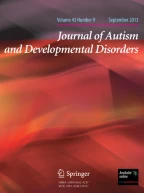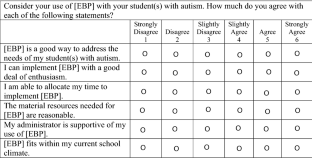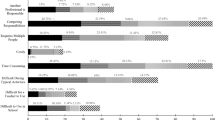Social Validity and Teachers’ Use of Evidence-Based Practices for Autism

The autism intervention literature focuses heavily on the concept of evidence-based practice, with less consideration of the acceptability, feasibility, and contextual alignment of interventions in practice. A survey of 130 special educators was conducted to quantify this “social validity” of evidence-based practices and analyze its relationship with knowledge level and frequency of use. Results indicate that knowledge, use, and social validity are tightly-connected and rank the highest for modeling, reinforcement, prompting, and visual supports. Regression analysis suggests that greater knowledge, higher perceived social validity, and a caseload including more students with autism predicts more frequent use of a practice. The results support the vital role that social validity plays in teachers’ implementation, with implications for both research and practice.
This is a preview of subscription content, log in via an institution to check access.
Access this article
Subscribe and save
Springer+ Basic
€32.70 /Month
- Get 10 units per month
- Download Article/Chapter or eBook
- 1 Unit = 1 Article or 1 Chapter
- Cancel anytime
Buy Now
Price includes VAT (France)
Instant access to the full article PDF.
Rent this article via DeepDyve

Similar content being viewed by others

Constructing an Assessment Tool for Conducting Social and Behavioural Interventions for Children with ASD
Chapter © 2022

A Literature Review of Social Communication Interventions for Individuals with Autism Spectrum Disorder in General Education Settings
Article 02 May 2022

Teachers’ Familiarity, Confidence, Training, and Use of Problem Behavior Interventions for Learners with Autism Spectrum Disorder in School Settings
Article 04 November 2022
References
- Aarons, G. A., Glisson, C., Hoagwood, K., Kelleher, K., Landsverk, J., & Cafri, G. (2010). Psychometric properties and US national norms of the evidence-based practice attitude scale (EBPAS). Psychological Assessment,22(2), 356–365. ArticleGoogle Scholar
- Briesch, A. M., Chafouleas, S. M., Neugebauer, S. R., & Riley-Tillman, T. C. (2013). Assessing influences on intervention implementation: Revision of the usage rating profile-intervention. Journal of School Psychology,51, 81–96. ArticleGoogle Scholar
- Brock, M. E., & Carter, E. W. (2017). A meta-analysis of educator training to improve implementation of interventions for students with disabilities. Remedial and Special Education,38(3), 131–144. ArticleGoogle Scholar
- Brock, M. E., Huber, H. B., Carter, E. W., Juarez, A. P., & Warren, Z. E. (2014). Statewide assessment of professional development needs related to educating students with autism spectrum disorder. Focus on Autism and Other Developmental Disabilities,29(2), 67–79. ArticleGoogle Scholar
- Callahan, K., Hughes, H. L., Mehta, S., Toussaint, K. A., Nichols, S. M., Ma, P. S., et al. (2017). Social validity of evidence-based practices and emerging interventions in autism. Focus on Autism and Other Developmental Disabilities,32(3), 188–197. ArticleGoogle Scholar
- Carter, S. L. (2010). The social validity manual: A guide to subjective evaluation of behavior interventions. London: Academic Press. Google Scholar
- Chafouleas, S. M., Briesch, A. M., Neugebauer, S. R., & Riley-Tillman, T. C. (2011). Usage rating profile—intervention (Revised). Storrs, CT: University of Connecticut. Google Scholar
- Combes, B. H., Chang, M., Austin, J. E., & Hayes, D. (2016). The use of evidenced-based practices in the provision of social skills training for students with autism spectrum disorder among school psychologists. Psychology in the Schools,53(5), 548–563. ArticleGoogle Scholar
- Cook, B. G., & Odom, S. L. (2013). Evidence-based practices and implementation science in special education. Exceptional Children,79(2), 135–144. Google Scholar
- Desimone, L. M., & Garet, M. S. (2015). Best practices in teachers’ professional development in the United States. Psychology, Society, & Education,7(3), 252–263. ArticleGoogle Scholar
- Dillman, D. A., Smyth, J. D., & Christian, L. M. (2014). Internet, phone, mail, and mixed-mode surveys: The tailored design method (4th ed.). Hoboken, NJ: Wiley. Google Scholar
- Dingfelder, H. E., & Mandell, D. S. (2011). Bridging the research-to-practice gap in autism intervention: An application of diffusion of innovation theory. Journal of Autism and Developmental Disorders,41(5), 597–609. ArticleGoogle Scholar
- Guskey, T. R., & Yoon, K. S. (2009). What works in professional development? Phi Delta Kappan,90(7), 495–500. ArticleGoogle Scholar
- Hardin, B. L., & Koppenhaver, D. A. (2016). Flipped professional development: An innovation in response to teacher insights. Journal of Adolescent & Adult Literacy,60(1), 45–54. ArticleGoogle Scholar
- Hess, K. L., Michael, A. E., Morrier, J., Juane, A. L., Ae, H., & Ivey, M. L. (2008). Autism treatment survey: Services received by children with autism spectrum disorders in public school classrooms. Journal of Autism and Developmental Disorders,38, 961–971. ArticleGoogle Scholar
- Horner, R. H., Carr, E. G., Halle, J., McGee, G., Odom, S., & Wolery, M. (2005). The use of single-subject research to identify evidence-based practice in special education. Exceptional Children,71(2), 165–179. Google Scholar
- Individuals with Disabilities Education Act, (2004) 20 U.S.C. § 1400.
- Joyce, B. R., & Showers, B. (2002). Student achievement through staff development. Alexandria, VA: Association for Supervision and Curriculum Development. Google Scholar
- Leblanc, L., Richardson, W., & Burns, K. A. (2009). Autism spectrum disorder and the inclusive classroom: Effective training to enhance knowledge of ASD and evidence-based practices. Teacher Education and Special Education,32(2), 166–179. ArticleGoogle Scholar
- Nakagawa, S., & Schielzeth, H. (2013). A general and simple method for obtaining R 2 from generalized linear mixed-effects models. Methods in Ecology and Evolution,4(2), 133–142. ArticleGoogle Scholar
- National Autism Center. (2015). Findings and conclusions: National standards project, phase 2. Randolph, MA: Author
- No Child Left Behind Act [NCLB], Pub. L. No. 1425 (2002). 115.
- North Carolina Department of Public Instruction. (2019). State summary of public school full-time personnel.http://apps.schools.nc.gov/ords/f?p=145:21. NO.
- Parsons, S., Charman, T., Faulkner, R., Ragan, J., Wallace, S., & Wittemeyer, K. (2013). Commentary-bridging the research and practice gap in autism: The importance of creating research partnerships with schools. Autism,17(3), 268–280. ArticleGoogle Scholar
- Paynter, J., & Keen, D. (2014). Knowledge and use of intervention practices by community-based early intervention service providers. Journal of Autism and Developmental Disorders,45, 1614–1623. ArticleGoogle Scholar
- Paynter, J., Sulek, R., Luskin-Saxby, S., Trembath, D., & Keen, D. (2018). Allied health professionals’ knowledge and use of ASD intervention practices. Journal of Autism and Developmental Disorders,48, 2335–2349. ArticleGoogle Scholar
- Robinson, L., Bond, C., & Oldfield, J. (2018). A UK and Ireland survey of educational psychologists’ intervention practices for students with autism spectrum disorder. Educational Psychology in Practice,34(1), 58–72. ArticleGoogle Scholar
- Sam, A. M., Cox, A. W., Savage, M. N., Waters, V., & Odom, S. L. (2019). Disseminating information on evidence-based practices for children and youth with autism spectrum disorder: AFIRM. Journal of Autism and Developmental Disorders. https://doi.org/10.1007/s10803-019-03945-x. ArticlePubMedGoogle Scholar
- Sansosti, F. J., & Sansosti, J. M. (2013). Effective school-based service delivery for students with autism spectrum disorders: Where we are and where we need to go. Psychology in the Schools,50(3), 229–244. ArticleGoogle Scholar
- U.S. Department of Health & Human Services. (2016). IACC/OARC autism research database. https://iacc.hhs.gov/funding/data/. Accessed 20 June 2019.
- Wolf, M. M. (1978). Social validity: The case for subjective measurement or how applied behavior analysis is finding its heart. Journal of Applied Behavior Analysis,11(2), 203–214. ArticleGoogle Scholar
- Wong, C., Odom, S. L., Hume, K. A., Cox, A. W., Fettig, A., Kucharczyk, S., et al. (2015). Evidence-based practices for children, youth, and young adults with autism spectrum disorder: A comprehensive review. Journal of Autism and Developmental Disorders,45(7), 1951–1966. ArticleGoogle Scholar
Acknowledgments
The author thanks Dr. Daniel Riffe, Professor of Media and Journalism at UNC Chapel Hill, for assistance with methodological design, implementation, and participant incentives. Additional acknowledgments provided to Dr. Cathy Zimmer and the consultants at the Odum Institute at UNC Chapel Hill for their statistical consulting services.
Author information
Authors and Affiliations
- The University of North Carolina at Chapel Hill, Chapel Hill, NC, USA Jordan McNeill
- Jordan McNeill
You can also search for this author in PubMed Google Scholar
Contributions
JM was the lead researcher and designed the study, collected data, conducted statistical analyses, and drafted and revised the manuscript.
Corresponding author
Ethics declarations
Conflict of interest
The author declares that they have no conflict of interest.
Ethical Approval
All procedures performed in this study involving human participants were in accordance with the ethical standards of the institutional research committee. IRB #18-2576 was reviewed by the Office of Human Research Ethics and was determined to be exempt from further review according to regulatory category 2, survey, interview, or public observation, under 45 CFR 46.101(b).
Additional information
Publisher's Note
Springer Nature remains neutral with regard to jurisdictional claims in published maps and institutional affiliations.
Electronic supplementary material
Below is the link to the electronic supplementary material.




